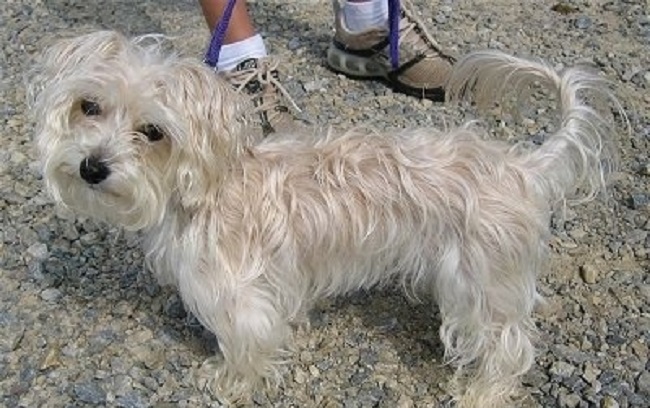In the world of designer Dogs, few breeds are as charming and distinctive as the ‘Yochon’, a delightful cross between the Yorkshire Terrier and the Bichon Frise.
Known for their adorable looks and dynamic personalities, Yochons have been capturing hearts worldwide. In this article, we delve into the finer details of this breed, covering everything from their personality traits to their specific care requirements.

Yochon: The Yorkshire Terrier & Bichon Frise Mix
Before we dive into the intricacies, let’s lay out some basic facts about the Yochon:
Breed Origins
The Yochon, also known as the Borkie, Yorkie Bichon, or Yorkchon, is a designer Dog that emerged in the 2000s. They were created to combine the best traits of the Yorkshire Terrier and Bichon Frise, two beloved breeds.
Size and Appearance
Yochons are small Dogs, usually weighing between 6 to 12 pounds and standing around 9 to 12 inches tall. They often feature the silky coat of a Yorkshire Terrier mixed with the curly hair of a Bichon Frise.
Lifespan
With proper care and a healthy lifestyle, Yochons can live from 10 to 15 years, providing companionship for a significant part of your life.
Unraveling the Yochon: Traits & Personality
The Yochon is a beautiful blend of the temperaments and characteristics of its parent breeds. Let’s explore their defining traits:
Temperament
Yochons are known for their friendly, playful, and sociable nature. They love human interaction and make great family pets.
Intelligence
Owing to their smart parent breeds, Yochons are quite intelligent and pick up on commands and tricks quickly.
Energy Levels
Though small in size, Yochons are energetic and require regular physical and mental stimulation.
Adaptability
Their small size and adaptable nature make them a great fit for various living conditions, from apartments to houses with yards.
Taking Care of a Yochon: Health, Diet, & Exercise Needs
Understanding the specific needs of your Yochon is key to their wellbeing:
Health
Like all breeds, Yochons may be prone to certain health conditions, such as dental problems, patellar luxation, and allergies.
Diet
Feeding your Yochon a well-balanced diet that meets their size, age, and activity level needs is crucial for their overall health. High-quality commercial Dog food or a vet-approved home-cooked diet is advisable.
Exercise
Despite their small size, Yochons require daily exercise to keep them mentally stimulated and physically fit. A combination of walks, play sessions, and mental stimulation games can keep them happy.
Grooming Your Yochon: Key Aspects to Consider
Maintaining the appearance and hygiene of your Yochon is a significant part of their overall care. Here’s what you need to know about grooming your Yochon:
Coat Care
Yochons often inherit the Yorkshire Terrier’s long, silky coat or the Bichon Frise’s curly, dense fur. Regardless, their coat requires daily brushing to prevent matting and tangling. Regular grooming every 4-6 weeks is also advisable to maintain a neat appearance and healthy skin.
Bathing
Due to their tendency for skin allergies, bathing your Yochon should be done carefully. Over-bathing can strip natural oils from their skin, causing dryness and irritation. Aim to bathe your Yochon once a month or whenever they get especially dirty.
Dental Health
Like their parent breeds, Yochons are prone to dental issues. Regular teeth brushing, at least two to three times a week, is necessary to prevent tartar buildup and gum disease.
Ear Care
Yochons, especially those with droopy ears, can be susceptible to ear infections. Regular ear checks and cleaning with a vet-approved solution can help prevent these issues.
Grooming not only keeps your Yochon looking their best but also provides an opportunity to check for any skin abnormalities, parasites, or changes in their general health. With regular care and attention, your Yochon can stay healthy, comfortable, and looking their best.
Conclusion
Yochons, a delightful blend of Yorkshire Terrier and Bichon Frise, are friendly, intelligent, and active Dogs that adapt well to different living environments. They make excellent companions for individuals and families alike.
If you’re ready for the responsibility of regular exercise, mental stimulation, and grooming, the Yochon could be a wonderful addition to your home.
























